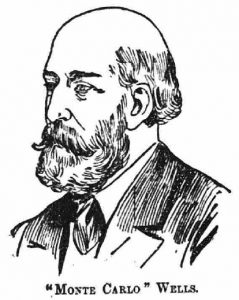 On this day, 125 years ago, Charles Deville Wells was poised to achieve the colossal wins at Monte Carlo which would make him famous.
On this day, 125 years ago, Charles Deville Wells was poised to achieve the colossal wins at Monte Carlo which would make him famous.
But he suddenly found himself in the awkward position of suffering from a cash-flow problem, which threatened his plans to win the equivalent of millions of pounds at the gaming tables. He had calculated that the sum of £6,000 – equivalent to £600,000 in today’s values – was needed to operate the ‘infallible gambling system’ that he claimed to have invented. Large sums of money – mostly gained dishonestly – had passed through his hands in recent years. But now, only 24 hours before he was due to put his plans into operation, his available capital fell far short of the required amount.
Evidence that I have discovered shows that – on the very eve of his Monte Carlo triumph – he was forced to employ desperate measures: buried among dozens of classified advertisements on the back page of The Times for this day in 1891 I discovered this tiny ad:
SEVENTY-FIVE POUNDS LOAN REQUIRED, immediately, for a short period. Full security and 15 per cent interest given. Safe investment. Only private investors treated with. Write Security, May’s, 162, Piccadilly.
In my book on Charles Deville Wells – ‘The Man who Broke the Bank at Monte Carlo’ – I show how this advert is directly traceable to Wells.
To be continued.
